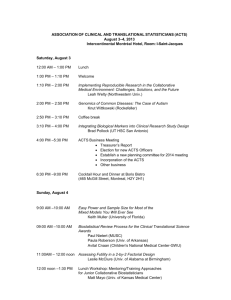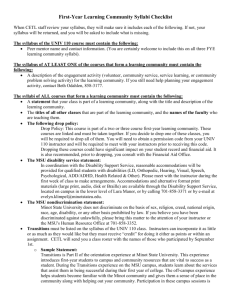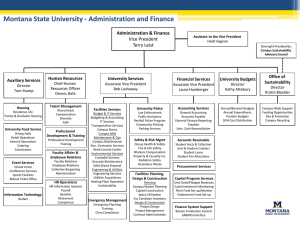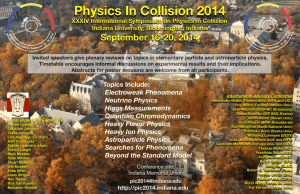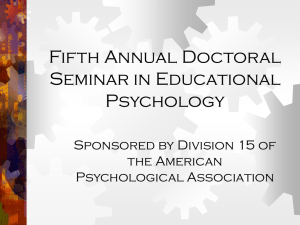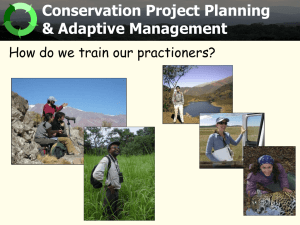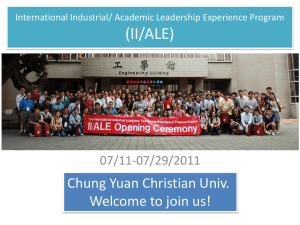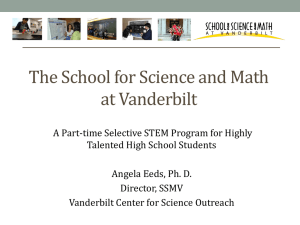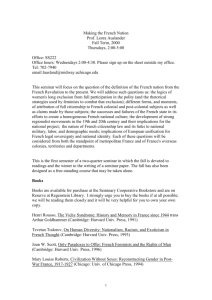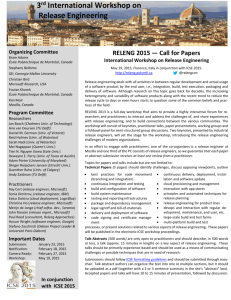UNIV 101 University College Seminar
advertisement
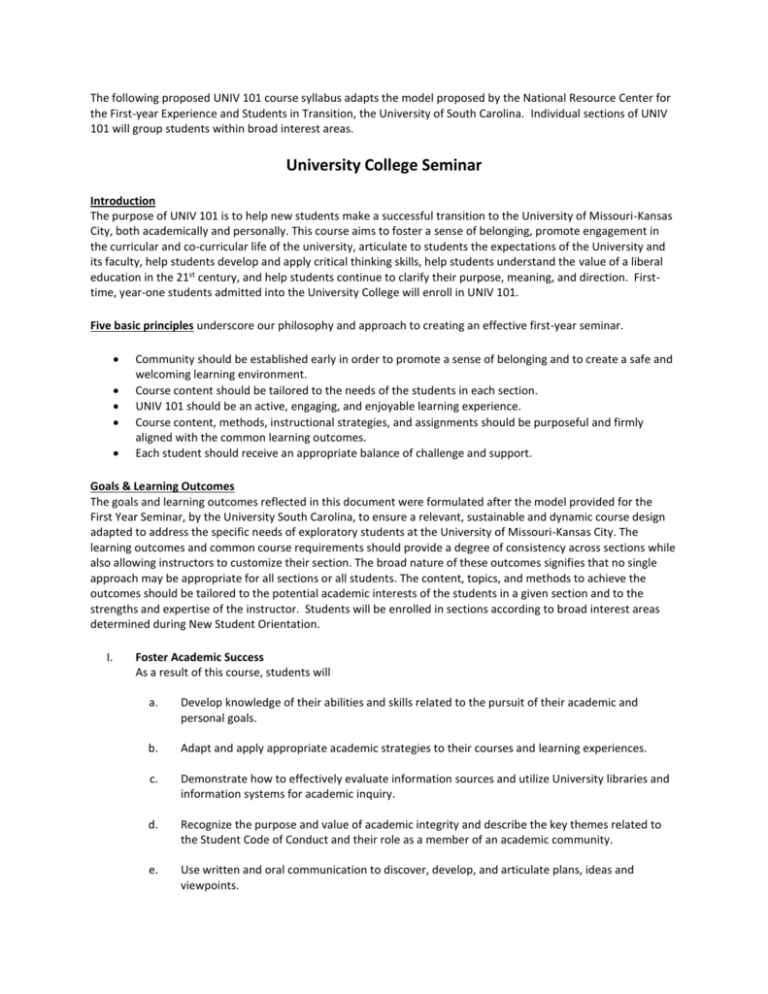
The following proposed UNIV 101 course syllabus adapts the model proposed by the National Resource Center for the First-year Experience and Students in Transition, the University of South Carolina. Individual sections of UNIV 101 will group students within broad interest areas. University College Seminar Introduction The purpose of UNIV 101 is to help new students make a successful transition to the University of Missouri-Kansas City, both academically and personally. This course aims to foster a sense of belonging, promote engagement in the curricular and co-curricular life of the university, articulate to students the expectations of the University and its faculty, help students develop and apply critical thinking skills, help students understand the value of a liberal education in the 21st century, and help students continue to clarify their purpose, meaning, and direction. Firsttime, year-one students admitted into the University College will enroll in UNIV 101. Five basic principles underscore our philosophy and approach to creating an effective first-year seminar. Community should be established early in order to promote a sense of belonging and to create a safe and welcoming learning environment. Course content should be tailored to the needs of the students in each section. UNIV 101 should be an active, engaging, and enjoyable learning experience. Course content, methods, instructional strategies, and assignments should be purposeful and firmly aligned with the common learning outcomes. Each student should receive an appropriate balance of challenge and support. Goals & Learning Outcomes The goals and learning outcomes reflected in this document were formulated after the model provided for the First Year Seminar, by the University South Carolina, to ensure a relevant, sustainable and dynamic course design adapted to address the specific needs of exploratory students at the University of Missouri-Kansas City. The learning outcomes and common course requirements should provide a degree of consistency across sections while also allowing instructors to customize their section. The broad nature of these outcomes signifies that no single approach may be appropriate for all sections or all students. The content, topics, and methods to achieve the outcomes should be tailored to the potential academic interests of the students in a given section and to the strengths and expertise of the instructor. Students will be enrolled in sections according to broad interest areas determined during New Student Orientation. I. Foster Academic Success As a result of this course, students will a. Develop knowledge of their abilities and skills related to the pursuit of their academic and personal goals. b. Adapt and apply appropriate academic strategies to their courses and learning experiences. c. Demonstrate how to effectively evaluate information sources and utilize University libraries and information systems for academic inquiry. d. Recognize the purpose and value of academic integrity and describe the key themes related to the Student Code of Conduct and their role as a member of an academic community. e. Use written and oral communication to discover, develop, and articulate plans, ideas and viewpoints. II. III. f. Identify and apply strategies to effectively manage time and priorities. g. Identify relevant academic policies, processes, and procedures related to advising, course planning, and major exploration. Help Students Discover and Connect with The University of Missouri – Kansas City As a result of this course, students will a. Identify appropriate campus resources and opportunities that contribute to their educational experience, goals, and campus engagement. b. Identify broad areas of academic interests, aptitudes, and abilities as a step toward major selection. c. Develop and apply skills that contribute to building positive relationships with peers, staff and faculty. d. Describe what it means to be a UMKC student in context of the history, traditions, and mission of the University. Prepare Students for Responsible Lives in a Diverse, Interconnected, and Changing World As a result of this course, students will a. Describe the knowledge and skills provided through a liberal education (general education) and the relevance of this knowledge and skills to their academic and career goals. b. Examine how their background and experiences impact their values and assumptions and explain the influence these have on their relationships with others. c. Describe concepts of diversity and recognize diverse perspectives. d. Describe and demonstrate principles of responsible citizenship within and beyond the campus community. e. Describe processes, strategies, and resources, and explain the implications of their decisions, related to their overall wellness. *Important Note: Instructors must be intentional in all aspects of course planning and design in order to facilitate student progress toward achieving these outcomes. You should also consider educational methods that promote the outcomes, such as community service, servicelearning, undergraduate research, cultural participation, and other beyond the classroom experiences. Specific Course Requirements In an effort to achieve these goals and learning outcomes, the requirements listed below will be included in all sections of UNIV 101. Students will complete a self-evaluation related to student success motivators, skills and knowledge. Students will chart 4-year graduation plans for potential majors in areas of academic interest. Students will set challenging personal and academic goals resulting in a personal development plan. Commitment to Academic Success Students will become aware of the time commitments necessary for academic success, specifically the investment of 2-3 hours of active study for every hour in class. Students will determine, with the assistance of their academic advisor and/or course instructor, the optimal study plan making use of both individual and group study options. Options will include the following: Supplemental Instruction (SI) for a designated course Individualized tutoring Scheduled study hall Writing Center review Peer-directed study group Academic Success Skills Development Students will determine, with the assistance of their academic advisor and/or course instructor, the academic skills seminars that will provide the greatest impact to their academic success. Students will select a minimum of two academic success seminars provided by the Center for Academic Develop. Topics include: Learning Styles and Note-Taking Study Skills and Testing Strategies Relaxing to Stay Focused Preparing For Finals Test Anxiety Reading Comprehension and Rate Improvement Making Your Money Count Integrative Learning UNIV 101 will play a key role in students' ability to articulate the significance of beyond the classroom experiences and the role these experiences play in contributing to their overall learning. In order to foster this outcome, each section must require students to participate in at least one beyond the classroom learning opportunity. Examples include, but are not limited to: Cultural event such as a theatrical performance, dance and/or music recital Community service Campus club/organization Residence hall programs Campus lecture Diversity events, such as those sponsored by the Office of Multicultural Student Affairs Outdoor Recreation program Leadership programs or workshops SEARCH-Undergraduate Research activities Career & Major Exploration Students will complete a series of assessments and discovery exercises to facilitate purposeful exploration. Required Readings As in other first-year courses, substantive reading is required for UNIV 101. This may include a text/novel, the FirstYear Reading Experience book, library components, local or national newspapers, or compilation of articles and/or chapters. Instructors should make substantive use of these readings. Assignments Assignments need to require students to demonstrate evidence of achieving the learning outcomes for the course. This will be accomplished through a mix of assignments, papers, presentations, and exams. At a minimum, each section will require students to complete: a method of regular written reflection (journals, blogs, short reaction papers, etc.) a formal paper a formal presentation midterm final exam. The final exam should challenge students to reflect upon and synthesize the major course goals. Methodologies could include portfolios, take home projects or papers, presentations, in-class exam, etc. It is important that new students receive early and regular feedback about their academic performance and that they have some sense of their progress in the course prior to the withdrawal date. Thus, students must receive a grade from at least one significant assignment within the first six weeks of the semester.
